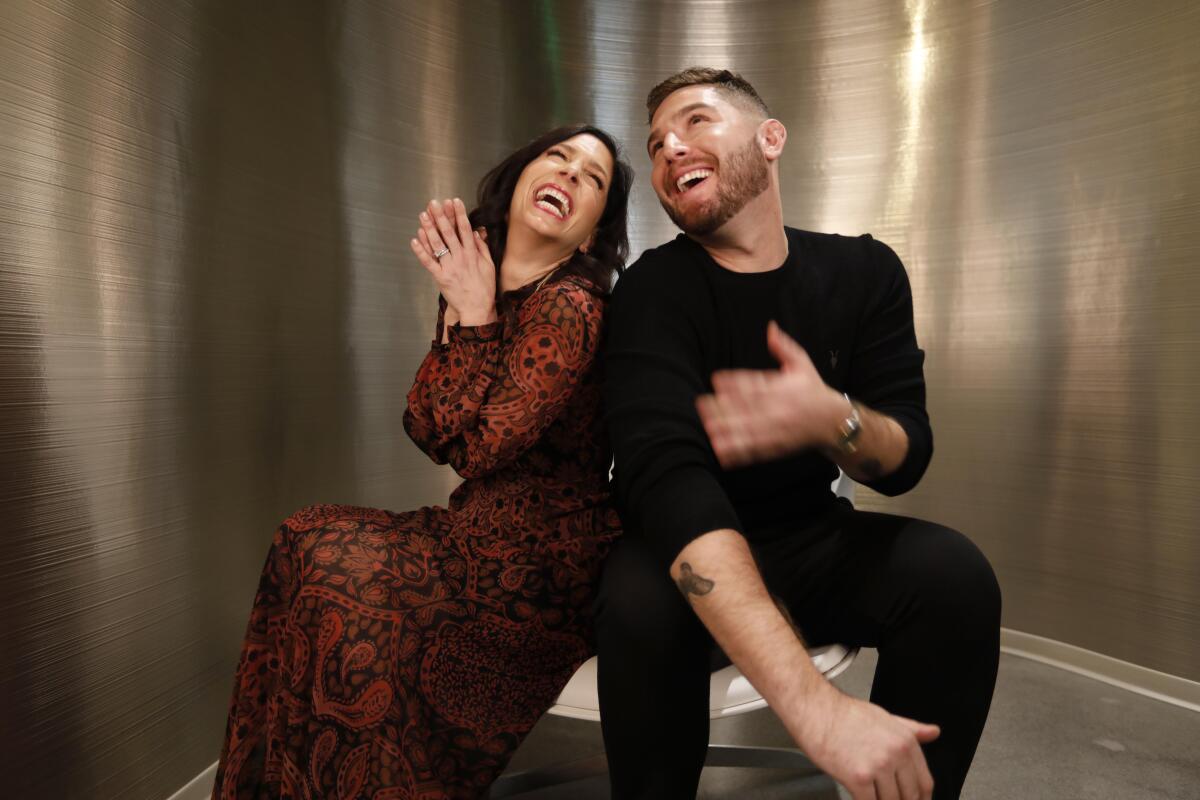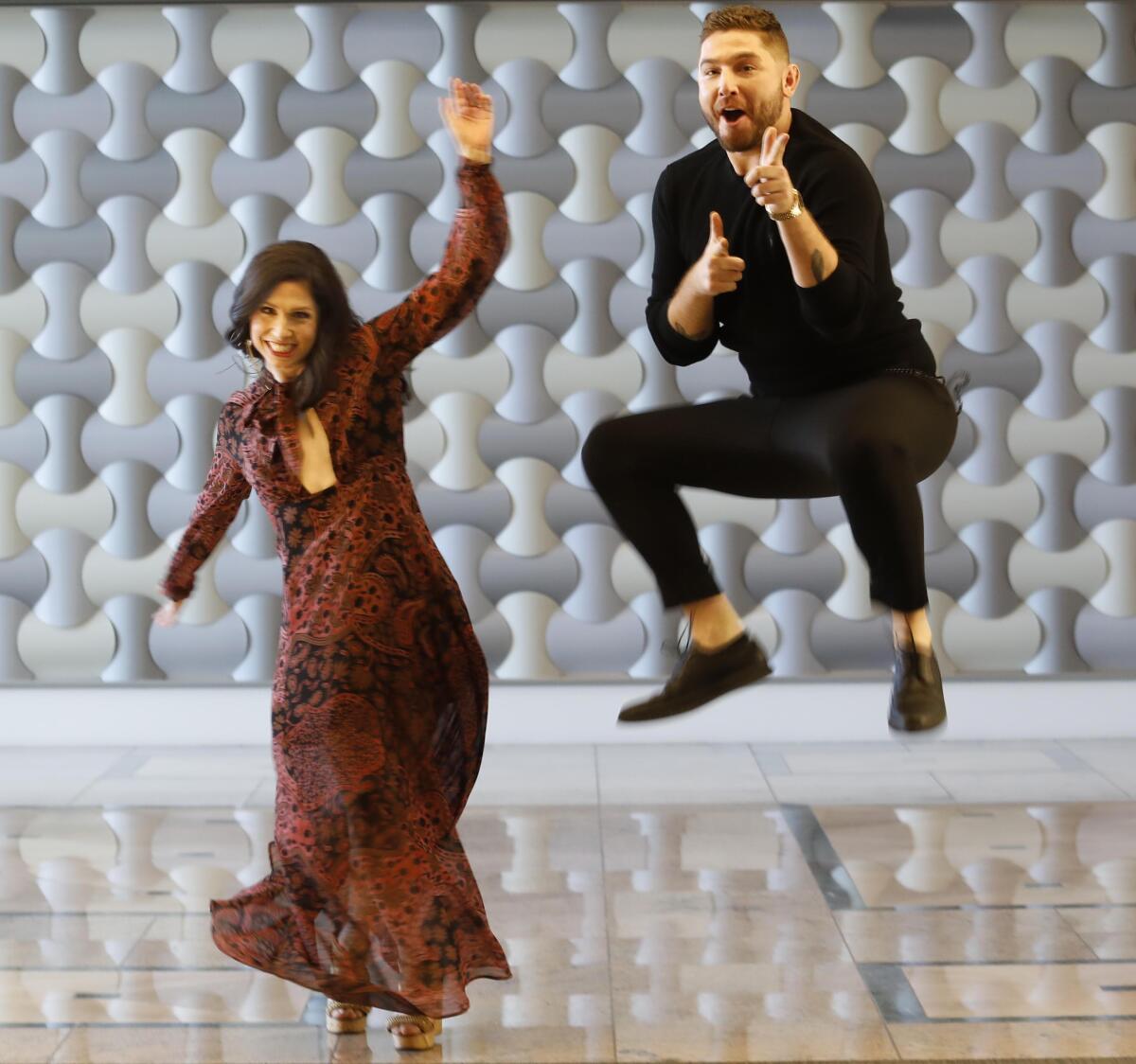Can a groundbreaking deaf comedy become the next ‘Schitt’s Creek’?

- Share via
Before “This Close” crept quietly into television history last year, there had never been a TV series created by and starring deaf actors. Now, thanks to Shoshannah Stern and Josh Feldman, there is.
For its second season, premiering Thursday, “This Close” — which previously had a gestational, short-form life on the web — moves from the streaming platform Sundance Now to its cable parent Sundance TV and expands from six to eight episodes. Historical significance aside, the series would only be worth discussing if it were any good, and it is very good: smart and sensitive, fearless and funny, unpredictable in a lifelike way, dark at times but illuminated by the personal charisma and interpersonal chemistry of its creator-leads. (The first season was nominated for Peabody and GLAAD Media awards.) Still, like “Schitt’s Creek,” which had been around for a few seasons on Pop before the wider world noticed, it may take something like Netflix distribution to get the show the very wide audience it deserves.
Stern, whose career has included stints on “Weeds” and “Supernatural,” plays Kate, who works in public relations. (Cheryl Hines plays her difficult boss, the series’ one completely comical character.) Feldman’s Michael is a graphic novelist, struggling to create a follow-up to a previous success. Each is involved in other, romantic relationships, while a shared impulsiveness often puts them out of joint with one another. But the heart of the show, and the viewers’ greatest concern, is their friendship.
In uncertain times, TV series like “Younger” are turning the romantic comedy on its head, rejecting notions like “happily ever after” and “one true love.”
“We wanted the show to be like a love story,” Stern said recently, through a translator, who also interpreted for Feldman. “A love story between two friends that are not and will never be in love with each other romantically. We did not want Kate and Michael to have dated in the past or anything like that. Friendship is often explored in TV as kind of a given. You don’t really have to work at it — it’s there. Romantic relationships we see the ups and downs, but with a friendship we don’t see it as much.”
“In general,” said Feldman, “both in TV and film — and in real life — romantic relationships are given more weight and importance. People are always saying, ‘It’s OK, you’ll find someone, you’ll find someone.’ But our friendships tend to last much longer than our romantic relationships — at least when you’re in your 20s, that can be very true. In many TV shows, we don’t see the friendship at the center. The friendship is often off to the side in a separate story line, while the lead is still looking for love. You only get a happy ending if you find someone romantically. But what if you’ve already found someone, and that’s a friend that’s going to be there with you through thick and thin?”
The two met “five or six years ago” in Los Angeles. Stern was an actress who had been writing and not telling anyone; Feldman was a writer who had no thought of becoming an actor. “We became friends right away,” he recalled. “We had very similar taste in TV shows and in movies; and one day Shoshannah said, ‘I have this script I want to show you.’ And I was like, ‘Oh, you’re a writer too.’”
Feldman and Stern formed a sort of two-person support group, as they worked on their individual projects. He was surprised to find she had written a heist thriller: “Honestly, I had expected a rom-com.” (Stern mentions a script of Feldman’s, written when he was 11, currently next to her bed: “It was very similar to ‘This Close,’ actually — a dark friendship.”)
“And then one day,” Stern continued, “I had this really horrible audition. It was for a deaf character, but there was no truth to it; it felt almost like a violation of what it means to be a deaf person. So I’m venting to Josh about how I don’t know how long I can keep doing this, I keep waiting for someone to create the story that finally feels familiar to me. So Josh says, ‘Why don’t we write that story together?’ It had never occurred to me before.”
For his part, Feldman had never created a deaf character. “Most of my scripts had gay leads; I tend to also have Jewish characters, because those are aspects of my identity I’m very familiar with. But before I started writing with Shoshannah, all my scripts were about hearing people, because that’s what I thought would sell.”
In their first drafts, Kate was deaf but Michael was hearing, said Stern. When they decided to make both characters deaf, “Josh was like, ‘That’s a great idea, so who’s going to play Michael?’ And I just looked at him.”

“For me as a new actor,” said Feldman, “the biggest learning curve has been not taking the work home with me. It did take me a while to really bounce back after filming on both seasons. At first I was a little bit confused — ‘I’m fine, I’m Josh, this is who I am.’ But as an actor you really delve into the psyche of your character; even if it’s just for the TV screen, it does feel real to you. So it took me a while to recover emotionally from filming.”
“I’ve been acting for 20 years,” said Stern, “and I’m not sure how to not take the work home with me.”
Feldman says the intensity affected their relationship.
“Every time that we had to film a scene where Kate and Michael were fighting or where Michael was so [messed] up he doesn’t remember what’s happening, afterwards I felt so bad I wanted to hug her, to make sure that we’re in a good place. There was one scene where I had to get very physical with Shoshannah, and afterwards all the producers were emailing notes. And I saw in that email, Shoshannah said, ‘I felt threatened last night.’ It wasn’t me, it was the character — I know that — but still I made her feel that way, and that was really tough for me.”
“Everyone said that scene was very hard to watch,” Stern added.
“I was showing this season to my family,” said Feldman, “and my mom kept screaming at the TV every time she would see Michael doing something wrong, and she kept looking at me, and I’m like, ‘Don’t look at me, I didn’t do that personally.’”
“Likable was always much less important to us than relatable,” said Stern. “The problem for me, with other deaf characters I’ve seen, and ones I’ve played myself, is that there is this mantle of, ‘We are representative. We’re here to educate people about our community. This is our purpose.’ So the character kind of disappears. No one person is always pleasant or always good, and if that’s the truth, then it’s not very interesting.”
Family plays an important part in the new season, which begins immediately on the heels of the first. (That ended with an accident; this starts in a hospital.) Kate returns home to Georgia in one of the stand-alone episodes the longer season allows for, where we meet her mother, played by Marcia Cross; Marlee Matlin returns as Michael’s mother, with Steven Weber introduced as his estranged father, and a bigger role for Moshe Kasher as his brother. Neither Kate’s nor Michael’s families resemble Stern’s or Feldman’s.
“About 90% to 95% of deaf people are born to families who can hear,” said Stern, “so their identities are very different from their parents. We were both born into deaf families, so we were able to really figure out who we are as people very early on, apart from People Who Are Deaf.”
“Our parents are involved in higher education,” said Feldman, “so we were forced to read early on — reading became a big love for me. I had access to both English and sign language, and grew up fully bilingual. No one was trying to ‘cure’ my identity of being a deaf person, which is very different from Michael and Kate’s experiences, and that comes to haunt them as adults. To move forward, they’re going to have to make peace with their past.
“One of my favorite shots of the whole season comes in episode two,” he continued, “with Millie Simmonds [as a deaf teenager who has not been taught to sign]. And she can see Kate and Michael signing to each other, these two deaf adults functioning just fine, having a conversation with each other. That is really so much of what I hope for future generations of deaf kids, that they’re able to find a show — that’s age-appropriate! — where they can really see themselves in it.”
More to Read
The complete guide to home viewing
Get Screen Gab for everything about the TV shows and streaming movies everyone’s talking about.
You may occasionally receive promotional content from the Los Angeles Times.







